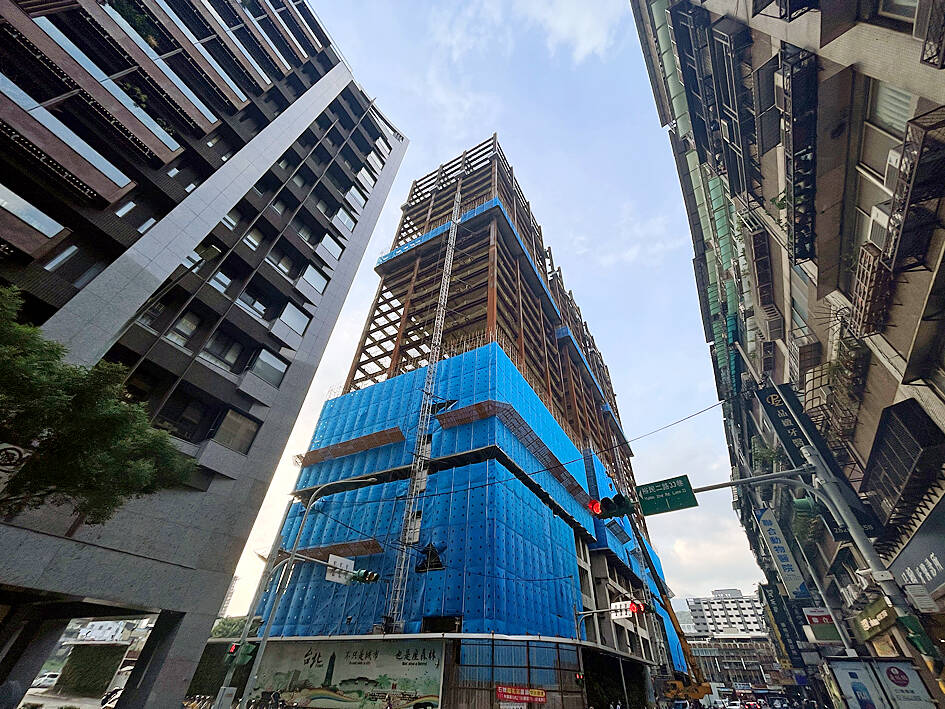Residential and commercial property transactions in the six special municipalities totaled about 19,000 units last month, up 3.7 percent from July and 14.4 percent from a year earlier, data released by the local governments on Wednesday last week showed.
An increase in the supply of pre-sale units, more working days per month and the stabilization of sales in Tainan and Kaohsiung led to the higher number of transactions last month, Sinyi Realty Inc (信義房屋) research manager Tseng Ching-der (曾敬德) said.
Housing sales last month in Tainan rose 9.9 percent monthly to 2,017 units, and in Kaohsiung they rebounded 9.1 percent to 2,925 units, following declines in July of 18.2 percent and 20.2 percent respectively, the data showed.

Photo: CNA
The sales rebound in Tainan came amid increased home construction in some areas — in Annan District (安南) — in particular, and a rebound in purchases in districts near the Southern Taiwan Science Park (南部科學園區), Taiwan Realty Co (台灣房屋) said.
Housing transactions last month in Annan totaled 390 units, up 12.7 percent from July, the most of any district in Tainan, ahead of Yongkang District (永康) with 241 units and Anping District (安平) with 186 units.
In Kaohsiung, the increase last month came mainly from buyers looking for homes for their own use, Taiwan Realty said.
In Taipei, housing sales fell 1.6 percent from July to 2,236 units, while transactions in New Taipei City dropped 4.9 percent to 4,468 units, data showed.
Property sales in Taoyuan totaled 3,482 units, down 1.6 percent from July, while transactions in Taichung rose 16.7 percent to 4,027 due to booming pre-sales, data indicated.
Housing transactions in the six municipalities from Jan. 1 to Aug. 31 totaled 169,137 units, up 0.2 percent from a year earlier.
Evertrust Rehouse Co (永慶房屋) research manager Chen Chin-ping (陳金萍) said she has a cautious outlook for housing transactions in Taiwan over the rest of the year because of rising interest rates worldwide.

MULTIFACETED: A task force has analyzed possible scenarios and created responses to assist domestic industries in dealing with US tariffs, the economics minister said The Executive Yuan is tomorrow to announce countermeasures to US President Donald Trump’s planned reciprocal tariffs, although the details of the plan would not be made public until Monday next week, Minister of Economic Affairs J.W. Kuo (郭智輝) said yesterday. The Cabinet established an economic and trade task force in November last year to deal with US trade and tariff related issues, Kuo told reporters outside the legislature in Taipei. The task force has been analyzing and evaluating all kinds of scenarios to identify suitable responses and determine how best to assist domestic industries in managing the effects of Trump’s tariffs, he

TIGHT-LIPPED: UMC said it had no merger plans at the moment, after Nikkei Asia reported that the firm and GlobalFoundries were considering restarting merger talks United Microelectronics Corp (UMC, 聯電), the world’s No. 4 contract chipmaker, yesterday launched a new US$5 billion 12-inch chip factory in Singapore as part of its latest effort to diversify its manufacturing footprint amid growing geopolitical risks. The new factory, adjacent to UMC’s existing Singapore fab in the Pasir Res Wafer Fab Park, is scheduled to enter volume production next year, utilizing mature 22-nanometer and 28-nanometer process technologies, UMC said in a statement. The company plans to invest US$5 billion during the first phase of the new fab, which would have an installed capacity of 30,000 12-inch wafers per month, it said. The

Taiwan’s official purchasing managers’ index (PMI) last month rose 0.2 percentage points to 54.2, in a second consecutive month of expansion, thanks to front-loading demand intended to avoid potential US tariff hikes, the Chung-Hua Institution for Economic Research (CIER, 中華經濟研究院) said yesterday. While short-term demand appeared robust, uncertainties rose due to US President Donald Trump’s unpredictable trade policy, CIER president Lien Hsien-ming (連賢明) told a news conference in Taipei. Taiwan’s economy this year would be characterized by high-level fluctuations and the volatility would be wilder than most expect, Lien said Demand for electronics, particularly semiconductors, continues to benefit from US technology giants’ effort

‘SWASTICAR’: Tesla CEO Elon Musk’s close association with Donald Trump has prompted opponents to brand him a ‘Nazi’ and resulted in a dramatic drop in sales Demonstrators descended on Tesla Inc dealerships across the US, and in Europe and Canada on Saturday to protest company chief Elon Musk, who has amassed extraordinary power as a top adviser to US President Donald Trump. Waving signs with messages such as “Musk is stealing our money” and “Reclaim our country,” the protests largely took place peacefully following fiery episodes of vandalism on Tesla vehicles, dealerships and other facilities in recent weeks that US officials have denounced as terrorism. Hundreds rallied on Saturday outside the Tesla dealership in Manhattan. Some blasted Musk, the world’s richest man, while others demanded the shuttering of his